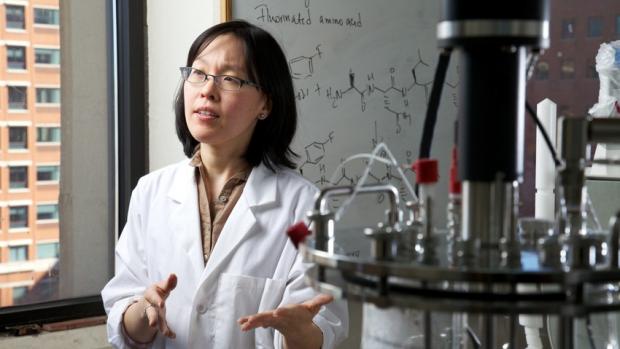NSF Grant Aims to Speed Gene Therapy Tool to Market

The National Science Foundation (NSF) has awarded Jin Kim Montclare of the NYU Polytechnic School of Engineering a grant to speed commercialization of an engineered protein and lipid mixture that could deliver nucleic acids into a wide range of living cells with great efficiency.
The research holds enormous commercial potential for gene therapy, as it eliminates the necessity to use multiple reagents or spend countless hours optimizing cell culture conditions. Existing transfection reagents—the chemicals that facilitate the delivery of nucleic acids into cells—are effective with only certain types of cells.
Montclare, an associate professor of chemical and biomolecular engineering, calls the innovation GeneTrain because it acts as a vehicle for genes to travel into the nucleus of a cell. By enabling nucleic acid delivery experiments across many different types of cells, GeneTrain will expedite and expand the discovery of new siRNA or DNA-based therapies. (siRNA silences or inhibits undesirable genes, while plasmid DNA aids in the introduction of desirable genes.)
Montclare is working with Kurt H. Becker, who is a professor of both physics and mechanical and aerospace engineering; in his role of School of Engineering vice dean for research, innovation and entrepreneurship, he will integrate the project into the school’s entrepreneurial and innovation initiatives. The research and commercialization team also includes doctoral candidate Joseph Frezzo and postdoctoral researcher Carlo Yuvienco.
They have already identified interested market partners—a condition of receiving the $200,000 grant, which falls under an NSF program known as Accelerating Innovation Research-Technology Translation (AIR-TT), meant to speed the commercialization of academic research.
Montclare and Becker are no strangers to the concept of applying their research to practical, real-world problems: Montclare is an alumna of I-Corps, an NSF program that prepares scientists and engineers to extend their focus beyond the laboratory and broadens the impact of their discoveries, while Becker has co-founded multiple startups based on his development of new plasma technologies.
As a result of their GeneTrain work, Frezzo and Yuvienco have been invited to participate in the New York City Entrepreneurship Lab (ELabNYC), a competitive six-month program that will develop their skills and give them the opportunity to interact with some of the world’s best venture capitalists, private philanthropists, medical clinics, and nonprofit foundations.




